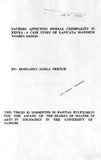| dc.description.abstract | This research was carried out at Lang'ata Women's Prison in Nairobi, Kenya. The major
objective of the study was to determine the factors affecting female criminality in Kenya
and the nature and extent of female criminality with reference to Lang'ata Maximum
Women's Prison.The study had nine hypotheses. The major hypothesis was that the women involved in low occupations and therefore materially deprived prior to custody are more likely to be charged with criminality than those with better opportunities. A sample of 200 women was selected for the study using simple random sampling method.The data was collected through direct personal interviews using questionnaires
containing both structured and non-structured questions. In addition, views on some of
the issues were sought from professionals from the fields of Social Work, Psychology,
Law, and Psychiatry. TIle data was analysed using descriptive statistics namely
percentages and cross tabulations.The major findings of the study were that most of the offenders were young, (between the ages of 16 - 35) single mothers, semi-literate, illiterate and with dependants, poor dwellers from the slum areas of Nairobi. These factors appeared to have high recurrence frequency in the study.The offenders had committed mainly petty crimes in form of loitering with intent to engage in
prostitution, possession of African Spirituous Liquor, hawking without licences, petty thefts of property and possession of bhang. It was further found that through these activities, the offenders earned their livelihood prior to arrest, as most of them were not gainfully employed.They earned very low incomes from these activities. Some of them were recidivists as they had been imprisoned before over similar crimes. The women cited financial constraint as the main causes of criminality.Based on the above findings the investigator makes a number of recommendations, to be
realised through:
- Economic empowerment of women through creation of more job opportunities.
- Facilitation of access to credit facilities by women;
- Planned parenthood;
- Non-custodial sentences for petty crimes by the women and introduction of training
programs by the Prisons Department to enable the ex-prisoners to get employment or
start some business of their own after discharge. | en |

